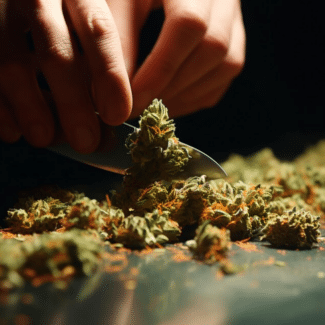
A Year in Review: Top Cannabis Trends of 2023
It’s nearly time to close the books on another year in the cannabis industry. 2023 was another action-packed year for the cannabis industry. New markets came online, some markets evolved, and cannabis sales fluctuated. The cannabis space is no stranger to change — but which headlines stood out and which were just a passing fancy? […]
It’s nearly time to close the books on another year in the cannabis industry. 2023 was another action-packed year for the cannabis industry. New markets came online, some markets evolved, and cannabis sales fluctuated. The cannabis space is no stranger to change — but which headlines stood out and which were just a passing fancy? We examine the top cannabis trends 2023 in this blog.
8 Cannabis Trends 2023
We examine the top cannabis trends 2023 in this blog, diving deep into what’s shaping the future of this dynamic and ever-evolving landscape.
1. Canna-Tech Grows
2023 was a good year for machine learning and artificial intelligence (who can forget the months when ChatGPT was dominating the headlines?) The cannabis industry is no stranger to evolving tech, but 2023 quickened the pace.
Automation and tech innovation can be a boon to cash-strapped cannabis companies. 2023 saw an increase in using artificial intelligence in cultivation automation, dispensary sales, customer service chatbots, mobile apps, and more. Machine learning can also help identify stable genetics, increase crop yield, and reduce labor costs. All across the supply chain, AI can help reduce redundancies, increase efficiencies, and positively impact a company’s bottom line – good news to cannabis businesses in 2023.
Expect to see this continue in 2024 — our digital world is only getting faster and smarter.
2. Mergers and Acquisitions Remained Small in the Cannabis Industry
M&A has been on the decline in the cannabis industry since 2022. There was hope at the start of 2023 that this may turn around, but that hasn’t proven to be the case.
The cannabis market was shocked by the failed merger of two MSOs: Columbia Care and Cresco. These two giants in the cannabis market first announced their intention to merge in 2022, but by August the deal was dead in the water. This failure exemplifies the state of M&A in the marijuana industry-wary investors, smaller pools of funding, and a permeating sense of uncertainty.
What little activity there has been in M&As is taking place in emerging markets, particularly on the East Coast, showing investor interest is focused on new markets, rather than mature markets. In these states, legal cannabis sales easily break records and there’s no past sales to compare it with — promising growth to investors and cannabis businesses alike.
3. Lab Shopping & Potency Fixation
The obsession with high-potency THC products in the cannabis market is one we’ve explored before. Consumers are asking for stronger weed and retailers can charge more for it, so naturally brands have fixated on this. As THC potency continues to rise, several brands have been caught artificially inflating their potency results, thanks to the practice of lab shopping.
Lab shopping is a common practice in the cannabis industry whereby a brand will shop around for a cannabis testing lab willing to deliver the potency results they want — regardless of how accurate they are. Labs across the country have been called out for this; from Florida to Nevada, regulatory boards are cracking down on this practice because it’s dishonest, dangerous, and erodes consumer trust.
Testing results and COAs are one of the main differentiators between the legal cannabis industry and the illicit market, and artificially inflating these results is bad for consumer trust and for cannabis sales. Let’s hope this is one of those cannabis trends we leave behind in 2023.
4. Investors Take A Stand Against Cannabis Companies
Investor interest in recreational cannabis has declined over the past two years. Many large cannabis corporations have repeatedly failed to hit their profitability or growth goals, prompting an outcry from investors who were promised a green rush.
This year, some investors took a stand against cannabis companies they thought were unethical. Three major cannabis companies were hit with lawsuits filed by their investors in 2023; two against Canadian companies Tilray and Canopy Growth, and three against American cannabis company Cookies.
5. Over Half of Americans Live Where Recreational Cannabis Legal
This is a headline that has been used a lot in recent years to highlight the unstoppable green wave of cannabis legalization. But it typically includes numbers from medical and recreational use states. No more.
When Ohio voters came together to legalize the plant in November, it became the 24th state to pass legalization efforts, making the cannabis plant available to 54% of the country’s population — no medical card required. You can expect to see this number increase again in 2024 during the election.
6. Minor Cannabinoids Increase Confusion Around Cannabis
Despite the aforementioned availability of cannabis, 26 states still do not have a recreational program. But thanks to a loophole in the 2018 Farm Bill, cannabis products are still available in almost all states — it just requires a little lab work.
Delta-8 THC, Delta-10 THC, HHC, and THC-O are some of the most common intoxicating cannabinoids that can be made from CBD flower. Cannabis users in prohibition states have been buying these in record numbers: D8 sales hit $2 billion at the start of 2023 and continued to rise.
In states without recreational weed programs, cannabis brands have other ways of getting around the Controlled Substances Act. Some states, like North Carolina, allow hemp shops to sell THC-A products. THCa is simply the acidic (unheated) form of THC, and unclear policies around cannabinoids continue to confuse consumers. The increase in sales of these products highlights the desire of Americans to have open access to cannabis.
7. Legal Cannabis Industry Grows in the Midwest
One of the most notable recreational cannabis markets to come online this year is in the heart of the Midwest: Missouri.
Missouri residents voted to legalize cannabis in November of 2022, with the market opening in February. By October, data company Headset reported that sales in Missouri had surpassed those in Colorado, ringing in over $100 million from legal cannabis sales (in a single month!)
This jump in sales signals the market potential of the state and a change in the tide of Midwesterner’s attitudes toward cannabis. The West Coast paved the way for cannabis reform and the East Coast has been following suit — but the heartland just may be the next key market to come online.
8. Stagnation in Cannabis Legislation at the Federal Level
Despite much excitement around the SAFE Banking Act and the CLAIM Act, legalization efforts of any kind fell short at the federal level this year.
President Biden made headlines at the end of 2022 when he pardoned simple marijuana possession charges at the federal level, and again when he suggested the U.S. Department of Health and Human Services (HHS) and Attorney General examine rescheduling cannabis — but ultimately, there was no meaningful movement towards federal legalization or scheduling this year.
Federally legal cannabis would turn every state-led industry on its head and create a world of opportunity for cannabis consumers. It’s a topic that comes up regularly in the marijuana industry, but it appears more in headlines than it does on the bills in the federal government. Perhaps 2024 will be the year federal legalization becomes a reality — but don’t hold your breath.
The cannabis industry has endured a series of volatile years since 2020 and 2023 was no exception. There was expansion and contraction, successes and failures. Consumer demand for cannabis products remained steady, even as wholesale prices fell. Now we turn towards the new year and the possibility it brings.
Protecting your cannabis company can seem confusing; however, we’re a full-service insurance brokerage working with carriers worldwide to offer you the best coverage possible. We’re here to help! Please reach out to us today by emailing [email protected] or calling 646-854-1093 for a customized letter of commitment or learning more about your cannabis insurance options.




